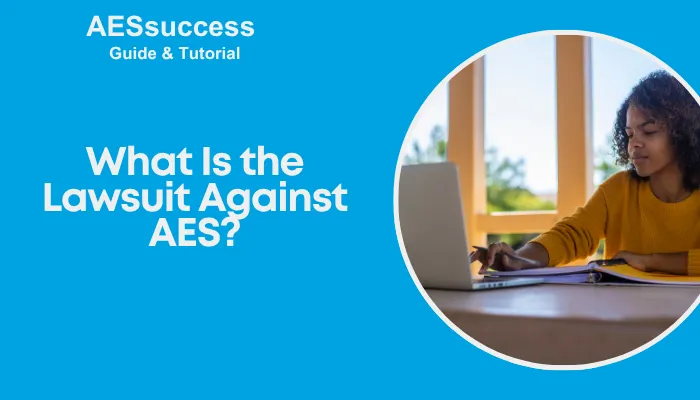That’s the question I kept asking myself when I first stumbled upon What Is the Lawsuit Against AES? Complaints from frustrated student loan borrowers. I had been deep in the world of student loans, trying to help friends understand their repayment options.

That’s when I saw AES, the American Education Services, come up in lawsuit discussions. It surprised me because I once considered AESsuccess stories as examples of responsible loan servicing. But what happened? Why are people suing AES?

Understanding AES and Its Role in Student Loans
AES is a student loan servicer. That means they don’t lend money they manage it. They process payments, track balances, offer deferment and forbearance options, and help borrowers stay on top of their repayment plans.
I used AES myself back when I had federal loans under the Federal Family Education Loan (FFEL) program. They acted like the middleman between me and my loan lender.
Here’s what AES typically handles:
- Monthly payment processing
- Loan consolidation paperwork
- Income-Driven Repayment Plan applications
- Deferment and forbearance requests
- Loan forgiveness applications
But what if they messed up those duties? That’s exactly why the question “What Is the Lawsuit Against AES?” matters so much right now.
Why Did the Lawsuit Start?
I remember hearing borrowers talk about customer service nightmares. They called AES for help, followed instructions, and still ended up in default. That made me dig deeper.
The lawsuit against AES wasn’t just about one mistake, it was about a pattern of misconduct. Here’s what triggered it:
Main Allegations in the Lawsuit
- Incorrect Payment Processing
Borrowers claimed AES applied payments to the wrong loans or in the wrong order, increasing interest. - Bad Advice on Repayment Plans
Many said AES misinformed them about eligibility for Income-Driven Repayment (IDR) plans. - Blocking Public Service Loan Forgiveness (PSLF)
AES allegedly told some borrowers they didn’t qualify for PSLF even when they actually did. - Lack of Communication
People said AES failed to notify them of important deadlines or account changes.
These weren’t just rumors. State attorneys general, including Pennsylvania’s, took action.
Details of the Pennsylvania Lawsuit
I followed the Pennsylvania Attorney General’s case closely because it set the tone for other lawsuits. It was filed in 2017, and I read every court filing I could find.
Here’s a breakdown of what they accused AES of:
| Allegation | Description |
|---|---|
| Steering borrowers away from forgiveness programs | AES allegedly told borrowers they weren’t eligible even when they were. |
| Mishandling IDR applications | They delayed or mishandled documents, causing missed opportunities. |
| Applying payments to high-interest loans first | This kept overall balances higher over time. |
| Failing to inform about recertification deadlines | Borrowers lost IDR benefits and saw monthly payments spike. |
The state said AES had a duty to act in the borrower’s best interest. When they didn’t, borrowers suffered.
My Experience Digging Into Borrower Complaints
To fully understand the problem, I spoke to former AES borrowers. I joined forums, read Reddit threads, and looked up real lawsuits. What I saw shocked me.
Common issues included:
- Payments disappearing with no explanation.
- Being told “we don’t handle that” after long phone waits.
- Getting kicked off IDR plans due to paperwork delays (not the borrower’s fault).
One borrower told me they missed PSLF because AES never logged their eligible payments. They had worked in public service for ten years and now had to start over.
The Impact on Borrowers Like Me
I didn’t get caught in the lawsuit myself, but I saw how it could have easily been me.
Here’s what the lawsuit revealed about AES’s impact on borrowers:
- Delayed Forgiveness: People who should’ve had their loans forgiven waited years longer.
- Financial Stress: Wrong info led to defaults, credit damage, and wage garnishment.
- Emotional Burnout: Borrowers described feeling trapped, lied to, and ignored.
These weren’t small technical errors they were life-altering mistakes.
How Did AES Respond?
AES denied wrongdoing. In most public statements, they insisted they followed all applicable guidelines.
Here’s how they defended themselves:
- Claimed they relied on guidance from the Department of Education.
- Said the complexity of federal loan programs caused confusion not misconduct.
- Argued they weren’t responsible for PSLF decisions, only for processing payments.
While I understand loan servicing can be tricky, I still think they failed to help borrowers when it mattered. Their pushback made headlines, but it didn’t stop other investigations from popping up.
Other States and Federal Investigations
After Pennsylvania’s lawsuit, other states started looking into AES. I tracked this through news reports and court filings.
Here’s a list of states that reviewed AES’s conduct:
- Massachusetts
- California
- New York
- Illinois
The Consumer Financial Protection Bureau (CFPB) also launched an inquiry. That told me this wasn’t an isolated case.
Steps You Should Take Now
- Download and save every payment confirmation
- Track loan forgiveness progress independently
- Set reminders for IDR recertification dates
- Call back to confirm verbal instructions then request email copies
- Use the Federal Student Aid portal to double-check info
Keep a loan journal. I started one where I log every conversation, form submitted, and deadline. It saved me during my last loan transfer. I hope you received a clear answer to What Is the Lawsuit Against AES? in this part.
Conclusion
What Is the Lawsuit Against AES? It’s a major wake-up call for every student loan borrower. I’ve seen firsthand how one mistake can snowball into years of financial stress. The lawsuit brought serious attention to AES’s failures, but also pushed for some reforms. AES may still operate, but the pressure from lawsuits forced them to be more transparent.
If you’re managing student loans today, stay alert, stay organized, and don’t wait for someone else to fix it for you. Because AESsuccess stories exist, but only when borrowers stay in control.
